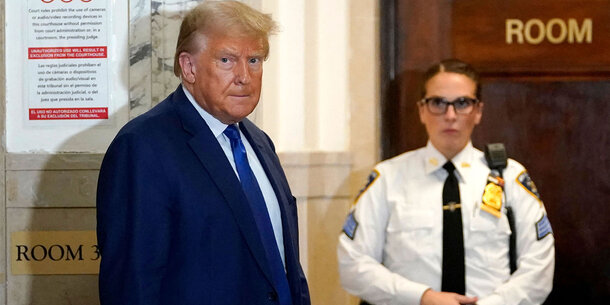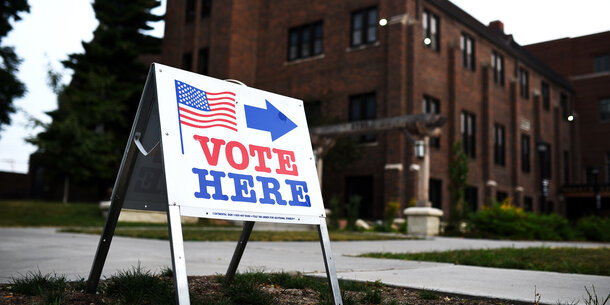In 2018, two-thirds of Florida voters approved Amendment 4, a state constitutional amendment that automatically restored voting rights for most people with felony convictions — except those convicted of murder or a felony sexual offense — who had completed the terms of their sentence, including probation and parole. An estimated 1.4 million people were expected to have their rights restored by the amendment.
However, state lawmakers and Gov. Ron DeSantis enacted Senate Bill 7066 in 2019, requiring people with past convictions to pay off all court-ordered debts assigned at the time of their felony sentencing. S.B. 7066 also defined the terms “murder” and “felony sexual offense,” for which voting rights are not automatically restored by Amendment 4, to include an amorphous list of crimes. But the state does not have a system for keeping track of whether, and how much, people owe, making it “sometimes hard, sometimes impossible” for those with past convictions to determine whether they are eligible to vote. And the state has done nothing to educate the public about the different ways that people with felony convictions must pursue voting rights restoration, which vary depending on the crime, terms of sentence, and court of conviction. Now the state is penalizing citizens struggling to navigate this complex system.
Last August, five days before Florida’s primary election, Governor DeSantis announced the arrests of 20 people with past felony convictions at a press conference, claiming they knowingly voted while ineligible even though publicly available evidence suggests most, if not all, of the individuals genuinely thought they were eligible.footnotei_ZBnrfxemEYtt-DD07KNy7QWocFj5e4ivNrqDpN6VT8_kiS8EVlM6AXJi The Brennan Center has only been able to identify 19 of the 20 people with past convictions charged by the OSP in August 2022. Flanked by more than a dozen law enforcement officers, DeSantis called the arrests the “opening salvo” of Florida’s new Office of Election Crimes and Security. He also announced that he tapped the Office of Statewide Prosecution (OSP) to prosecute these cases because some local state attorneys have been “loath to take these cases.” Despite DeSantis’s remarks about state attorneys, some have brought similar charges against people with felony convictions—who likewise thought they were eligible.
State trial courts dismissed five of the OSP’s prosecutions on the ground that the office lacked jurisdiction to bring them. The state appealed those dismissals, and the cases are now before the Florida intermediate appellate courts.footnoteii_EkX08A8o4YZyLGXsO0MquWpMznaQsuWNfKxoT42bMqs_rsLlk3S8f6MOii The four cases on appeal related to the OSP’s jurisdiction are State of Florida v. Miller, No. 3D22–2180; State of Florida v. Wood, No. 3D22–1925; State of Florida v. Washington, No. 6D23–2104; and State of Florida v. Hubbard, No. 4D22–3429. The state voluntarily dismissed one of the cases it appealed. State of Florida v. Suggs, No. 4D23–1383 (Fla. 4th DCA August 10, 2023). Two of the cases that made it to trial resulted in convictions, with split jury verdicts. (In one case, the jury determined the defendant was guilty of voting while ineligible but not guilty of registering, and vice versa in the other case.) Both defendants have appealed their convictions, and the cases are also before Florida immediate appellate courts.footnote3_sG8sfAAB7OzAIuX93prNbv10fyDMQMGgce6MALxUg_y6aijabu0cMo3Rivers v. State of Florida, No. 1D23–1473; Hart v. State of Florida, No. 2D23–0493. The Brennan Center has prepared this annotated guide, which summarizes each amicus (or “friend-of-the-court”) brief’s most prominent points.
State Appeals of Dismissals (OSP Jurisdiction)
Our brief explains how the OSP’s prosecutions are at odds with the office’s constitutional authority, purpose, and historical practice. The OSP was created by the Florida legislature and voters in 1987 to prosecute organized criminal activity that could not be effectively handled by a local state attorney because it occurred in or affected multiple parts of the state. Our brief also highlights how these prosecutions are particularly inappropriate because they are targeted not at organized crime but at isolated instances of voter confusion caused by Florida’s failure to administer its voting rights restoration system. In addition, our brief explains how allowing the OSP to bring these types of cases will chill voting among eligible Floridians with past convictions, who are disproportionately Black because of bias in the criminal system. The law firm Proskauer Rose LLP joined the Brennan Center, ACLU, ACLU of Florida, and NAACP Legal Defense Fund as co-counsel.
This brief from the Niskanen Center and former Florida state senator Jeff Brandes explains how the state is improperly using criminal prosecutions to compensate for its inability to review voter registration applications. Pointing to bedrock principles of statutory interpretation, it also explains why the state cannot retroactively apply a law passed after the dismissal of these cases to justify the OSP’s authority. In addition, the brief explains how the state’s arguments would drastically and improperly expand the OSP’s authority. The law firm Reed Smith LLP is counsel for the Niskanen Center and Brandes.
This brief — filed by two former members of the Commission on the Statewide Prosecution Function, which was deeply involved in the creation of the OSP — explains how the OSP was created to prosecute organized crime and complex criminal cases that state attorneys are ill-equipped to handle. As a consequence, the brief argues that these prosecutions for alleged voting crimes, in which there is neither mention of an alleged statewide conspiracy nor any organized criminal activity that could not be effectively prosecuted by a state attorney, bear no resemblance to the purpose of the OSP. The law firms Akin Gump Strauss Hauer & Feld LLP and Reid Levin, PLLC are co-counsel for the former members of the commission.
Brief of the Association of Prosecuting Attorneys in Support of Defendants-Appellees
This brief from the Association of Prosecuting Attorneys explains how allowing the OSP to prosecute individual voters for allegedly voting while ineligible, notwithstanding the prosecutorial decisions made by locally elected state attorneys, would fly in the face of fundamental constitutional principles on which the criminal justice system is built — namely, prosecutorial independence and the democratic principle that local elected officials are responsible to the electorate that chose them. The law firm Quinn Emanuel Urquhart & Sullivan, LLP is counsel for the APA.
This brief from the Florida Association of Criminal Defense Lawyers–Miami Chapter argues the Florida Constitution and sound federalism-based policy considerations prohibit the OSP’s prosecutions because local state attorneys are the only offices with authority to prosecute these types of cases, and they have not done so. The Florida Association of Criminal Defense Lawyers–Miami Chapter filed this brief on its own behalf.
This brief from state constitutional law scholars Robert F. Williams and Quinn Yeargain explains how these cases violate the Florida Constitution. Using constitutional history, the brief explains how local state attorneys have exclusive power to prosecute local crimes, such as an individual allegedly voting while ineligible, and in contrast, the OSP’s authority is limited to a narrow set of crimes that occur in or affect multiple parts of the state, such as organized crime. As a consequence, the brief argues these cases are beyond the OSP’s authority. Professor Yeargain and the law firms Willkie Farr & Gallagher LLP and Toth Funes PA are co-counsel for the scholars.
Brief of the Due Process Institute in Support of Defendants-Appellees
This brief from the Due Process Institute argues the OSP abused its prosecutorial discretion by bringing these cases in the absence of the required mens rea, by bringing these cases despite lacking the jurisdiction to do so, and by ignoring the decisions of local state attorneys who declined to prosecute similar cases given the lack of criminal intent. In addition, the brief argues the OSP’s prosecutions of these citizens — after the state’s own actions led them astray — violate fundamental principles of fairness. The law firm Davis Wright Tremaine LLP is counsel for the DPI.
Defendants’ Appeals of Convictions
Our brief explains how upholding the jury verdict below, despite the state’s failure to adduce evidence that Rivers willfully voted while knowing he was ineligible, would criminalize good-faith mistakes by people with past convictions like Rivers, whom the state has confused or misled about their eligibility and whom the state has prosecuted only after allowing them to vote. Our brief also explains how the criminalization of such good-faith mistakes, given the widespread confusion in Florida around the voting eligibility of people with felony convictions, would chill voting among eligible voters with past convictions, who are disproportionately Black because of bias in the criminal system. The ACLU of Florida and the law firm O’Melveny & Myers LLP are counsel for the Brennan Center, ACLU, ACLU of Florida, and NAACP Legal Defense Fund.
Brief of Florida Rights Restoration Coalition in Support of Defendants-Appellants
This brief — filed by the Florida Rights Restoration Coalition, a membership organization led by people with past convictions that championed the effort to pass Amendment 4 — explains how the state’s inability to administer its election system has misled not just Rivers but also many of the coalition’s members. The brief also explains how the state’s prosecution of honest mistakes has deterred FRRC’s members from registering or voting, hindering its efforts to ensure that the promise of Amendment 4 is fully realized. The law firms Paul, Weiss, Rifkind, Wharton & Garrison LLP; Stearns Weaver Miller Weissler Alhadeff & Sitterson, P.A.; and the Law Offices of Thomas Warren are co-counsel for the FRRC.
Brief of Florida Criminal Law and Criminal Procedure Scholars in Support of Defendants-Appellants
This brief from Florida criminal law and criminal procedure scholars explains that the requirement of mens rea — having a culpable state of mind — is a fundamental safeguard against punishment for unknowingly unlawful conduct. The brief argues that Rivers’s conviction should be overturned because the trial court misapplied the mens rea standard under Florida law. Namely, Florida statute explicitly requires that a voter has knowledge of their ineligibility, and votes anyway, before they can be criminally liable for voting while ineligible. Yet the state failed to introduce evidence of Rivers’s actual knowledge of his ineligibility. The law firm King & Spalding LLP is counsel for the scholars.
Brief of Harvard Law School’s Election Law Clinic in Support of Defendants-Appellants
This brief from Harvard Law School’s Election Law Clinic explains how the chilling effect on eligible voters caused by the uncertainty around who is eligible to vote after a felony conviction and the state’s prosecutions of good-faith errors is similar to the chilling effect on speech that the U.S. Supreme Court has cited to justify its rulings striking down regulations in the First Amendment context. The brief also explains how the Department of Justice and federal courts have recognized that law enforcement activity, including prosecutions for alleged voter fraud, can itself constitute unlawful voter intimidation. Messer Caparello, P.A., is co-counsel with Harvard Law School’s Election Law Clinic.
This brief from the Due Process Institute and former Florida state senator Jeff Brandes argues that Florida’s decision to prosecute Rivers, despite his honest belief that he was eligible to vote, was an egregious abuse of prosecutorial discretion. In addition, the brief explains how Florida has failed to satisfy its obligations to verify eligibility and remove ineligible voters from the rolls in a timely way. This dereliction of duty, the brief explains, makes the state’s prosecutions of voters who mistakenly registered or voted — after the state itself gave every indication they were eligible — fundamentally unfair. The law firm Davis Wright Tremaine LLP is counsel for the DPI and Brandes.
Brief of Faith-Based Organizations and Religious Leaders in Support of Defendant-Appellant
This brief from 14 faith-based organizations and religious leaders argues the state’s punishment of Hart for his confusion runs contrary to core religious teachings about intent, mercy, and compassion, and the common-law principles that these teachings inspired. The brief also argues that Hart’s conviction undermines Amendment 4’s promise of forgiveness and redemption by dissuading eligible voters from registering and voting for fear of prosecution. As a result, the brief argues the court should overturn Hart’s wrongful conviction. The law firm Covington & Burling LLP is counsel for the faith-based organizations and religious leaders.
End Notes
-
footnotei_ZBnrfxemEYtt-DD07KNy7QWocFj5e4ivNrqDpN6VT8_kiS8EVlM6AXJ
i
The Brennan Center has only been able to identify 19 of the 20 people with past convictions charged by the OSP in August 2022. -
footnoteii_EkX08A8o4YZyLGXsO0MquWpMznaQsuWNfKxoT42bMqs_rsLlk3S8f6MO
ii
The four cases on appeal related to the OSP’s jurisdiction are State of Florida v. Miller, No. 3D22–2180; State of Florida v. Wood, No. 3D22–1925; State of Florida v. Washington, No. 6D23–2104; and State of Florida v. Hubbard, No. 4D22–3429. The state voluntarily dismissed one of the cases it appealed. State of Florida v. Suggs, No. 4D23–1383 (Fla. 4th DCA August 10, 2023). -
footnote3_sG8sfAAB7OzAIuX93prNbv10fyDMQMGgce6MALxUg_y6aijabu0cMo
3
Rivers v. State of Florida, No. 1D23–1473; Hart v. State of Florida, No. 2D23–0493.







